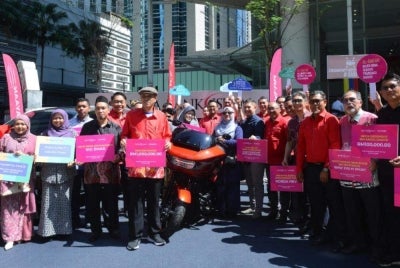Hard to be high-income country if women’s participation in job market still low, expert says

SHAH ALAM - Malaysia will continue to face difficulties in becoming a high-income country if the low level of female involvement in the job market in Malaysia is not properly addressed.
Centre for Future Labour Market Studies (EU-ERA) Senior Economist Dr Muhammad Daaniyall Abd Rahman said the involvement of women, especially those who were skilled and well-educated impacted the country's productivity.
He explained that the importance of the group's involvement in the economic progress of a country was also evident when most high-income countries had a high percentage of participation in their respective job markets.
"For example in Singapore (developed countries), their KPTB is almost 70 per cent.
"So there's a difference of 15 per cent between Singapore and Malaysia which currently only on 55 per cent," he said when contacted by Sinar Harian on Friday.
On Thursday, Prime Minister Datuk Seri Ismail Sabri Yaakob said the involvement of Women in terms of participation in the labour market was still low compared to other southeast Asian countries.
Ismail Sabri said that although the entry level of Malaysian women in all levels of Education whether low, secondary or tertiary was high but women’s participation rate in the labour market was low.
In the meantime, Daaniyall said, the low percentage of participation was most likely because the vast majority of women in Malaysia left the job market too early after reaching a certain age.
"In terms of data published by the Department of Statistics Malaysia (DOSM) in 2021, in fact, the KPTB rate of women aged 25 to 45 years is still high which is between 75 and 81 per cent.
"But for ages beyond 45, the KPTB rate has started to drop to 52 per cent to 23 per cent. This shows that the participation of the female labour force decreases after the age of 45," he said.
Daaniyall said the trend occurred due to the need to meet family commitments as well as the absence of a good support system to enable them to manage their household.
"Many elements need to be looked at, perhaps due to family commitments or they are not confident in the childcare system in Malaysia due to many (safety) issues.
“In addition, sometimes the cost of services at the nursery may also increase, resulting in the rate not being commensurate with the salary received," he explained.
Because of this, she said, most women, especially those who were skilled workers, were likely to only be in the job market for between 10 and 15 years.
To address the issue, Daaniyall, who was also the Universiti Putra Malaysia (UPM) School of Business and Economics Senior Lecturer suggested that long-term steps could be taken by offering high-value job opportunities for women.
"For the short and medium term, appropriate measures and policies need to be implemented to give them the opportunity to return to the job market.
"It means that if there is a professionally skilled woman who has chosen to be at home due to family factors, for example, it may be possible to provide incentives in terms of providing a better foster centre or more flexible working hours," he said.

Meanwhile, Chief Statisticians Datuk Seri Mohd Uzir Mahidin said women’s KPTB in the country showed a modest increase in the last 10 years.
"For 2021, the percentage of KPTB only increased by 0.2 points to 55.5 per cent compared to the 55.3 per cent recorded in 2020.
"If you look at the comparison in the last 10 years, women's KPTB only reached 48.0 per cent in 2011, an increase of 7.5 percentage points (compared to 2021).
"Meanwhile, the comparison of the five-year time series back, the KPTB rate only increased by 1.2 points (compared to 2021) from 54.3 per cent in 2016," he said when contacted by Sinar Harian on Friday.
Download Sinar Daily application.Click Here!














